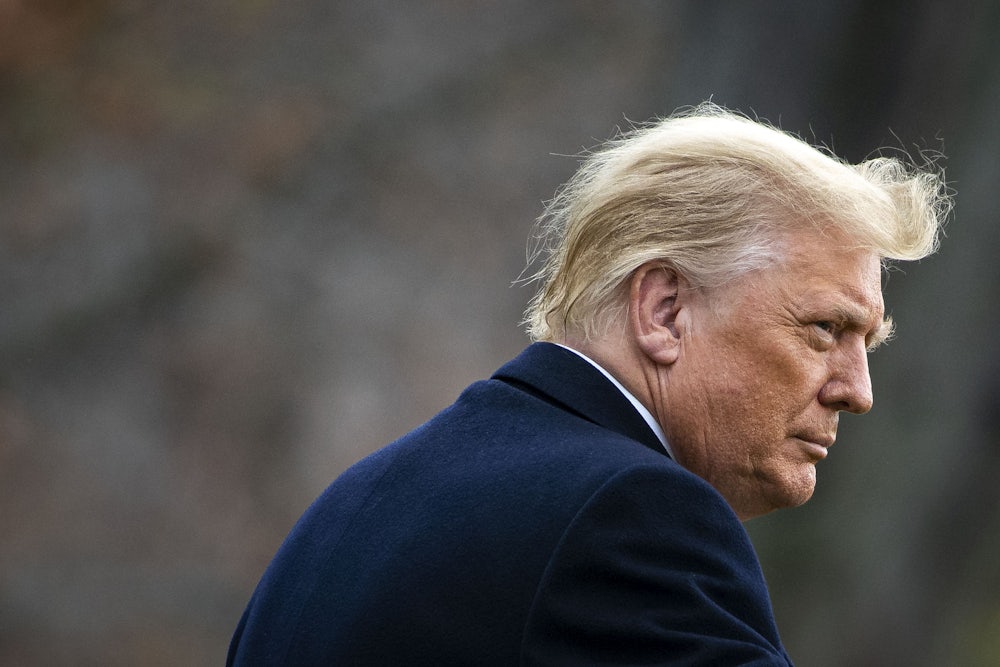Tom Cotton has been one of Donald Trump’s most loyal and consistent supporters. He has defended Trump repeatedly, even when the president in September refused to commit to a peaceful transfer of power. The Arkansas senator has pushed for drastic cuts to legal immigration and refers to Covid-19 as the “China virus.” When protests raged across the country in response to George Floyd’s murder by Minneapolis police officers, Cotton argued that Trump wasn’t going far enough—he should “send in the troops” to American cities. Trump’s wild idea about buying Greenland? That came from Cotton.
None of that matters anymore. It’s Tom Cotton’s turn in the barrel. On Monday, Cotton made it clear that he wouldn’t be joining Josh Hawley, Ted Cruz, and a dozen other Republican senators in contesting the 2020 election, arguing that doing so would undermine the Electoral College, the GOP’s only reliable means of winning the presidency. (Only one Republican, George W. Bush, in 2004, has won the popular vote since 1992.) Trump responded by tweeting, “How can you certify an election when the numbers being certified are verifiably WRONG. [Senator Tom Cotton,] Republicans have pluses & minuses, but one thing is sure, THEY NEVER FORGET!”
For a president obsessed with loyalty, any break is seen as unforgivable. Senate Majority Leader Mitch McConnell was also one of Trump’s most reliable backers and defenders; he, too, is being attacked as a turncoat. Georgia Governor Brian Kemp, one of the biggest defenders of Trump’s disastrous handling of Covid-19, has become public enemy number one. Trump’s base, meanwhile, has thrilled to attacks on the Republican Party. Protesters at the “Million MAGA March” in December chanted “Destroy the GOP.” They may be coming for Mike Pence next: On Tuesday, Trump falsely claimed that Pence, as vice president, has “the power to reject fraudulently chosen electors” when Congress convenes to certify Joe Biden’s victory in November.
In his final days in office, Trump is doing what many believed he would do four years ago: He’s tearing his party apart.
This was all supposed to happen back in 2016. Trump’s populism and complete lack of interest in conservatism, combined with his disdain for Republican Party stalwarts like John McCain and George W. Bush, would cleave the party’s base in two. Trump “offers a barking carnival act,” Rick Perry said, in the summer of 2015, “a toxic mix of demagoguery, mean-spiritedness and nonsense that will lead the Republican Party to perdition if pursued.” He labeled Trump a “cancer on conservatism,” one that “must be clearly diagnosed excised and discarded.” (Perry went on to be Trump’s energy secretary.)
This was, more or less, a take shared by pundits across the political spectrum. Trump was an existential threat to the GOP for two reasons. The first was that he was pursuing an anti–free trade, pro–welfare state agenda that ran counter to the dogmas that had defined the GOP for generations. And the second and most important was that he was going to get massacred in the 2016 election, a loss so debilitating that it would rattle the foundations of the party itself.
That, of course, never happened. The Democratic “blue wall” in the upper Midwest crumbled; that populist, anti–free trade, pro-spending message found an audience in Michigan, Wisconsin, and Pennsylvania. And while some Republicans—Paul Ryan, Bob Corker, Mitt Romney, Justin Amash—would break with the president, by and large, the expected fissure never happened. It never even came close to happening, either.
Trump was given wide latitude on pet issues, particularly trade, while largely hewing to Republican orthodoxies on deregulation and tax cuts. Trump’s presidency unfolded as a series of loyalty tests that most Republicans passed with flying colors. When Trump tweeted insane shit at four in the morning, Republicans pretended not to have seen it. When a whistleblower revealed that Trump had pressured Ukraine’s prime minister to open an investigation into Joe Biden, they defended him; when Democrats impeached him, he was easily acquitted in the Senate. Even when he refused to concede the presidential election, nearly every Republican in Congress stood with him for well over a month, arguing that he had every right to pursue baseless court cases that were being thrown out with prejudice again and again.
But Trump, Slate’s Jim Newell wrote, “waited until the final weeks of his presidency to deliver congressional Republicans one of his most debasing loyalty tests: demanding they vote to overturn the results of a presidential election he lost fair and square, to which any challenges—typically based on social media disinformation, or pure hallucinatory fantasy—have been dismissed time and again in court.” This loyalty test has done what the others have largely failed to do: It has driven a wedge through the Republican Party, one that may very well persist for years to come.
Trump’s main boosters in the Senate are backing him for reasons relating to their ambition. Hawley and Cruz have their eyes on the GOP’s presidential nomination in 2024 and see contesting the election as a means of cozying up to the president’s base. Others are up for reelection in 2022 and fear a primary challenge. Trump has, after all, made it clear that failure to support him now will be met with consequences down the line. He has already pledged to campaign against Kemp in Georgia in two years, when he will be up for reelection. He has dubbed senators like Cotton and McConnell the “Surrender Caucus” for failing to back his assault on democracy.
Trumpism has never really manifested itself as an ideology; it is often contradictory and rarely makes much sense. Trump’s presidency has been a hodgepodge of his whims and incoherent statements, melded with the bog-standard conservatism of McConnell and other leading Republicans. It’s fitting that the issue tearing the GOP apart isn’t Trump’s populism or his disinterest in conservative principles. Instead, the issue that is tearing the Republican Party apart is the only one that Trump really cares about: loyalty.
